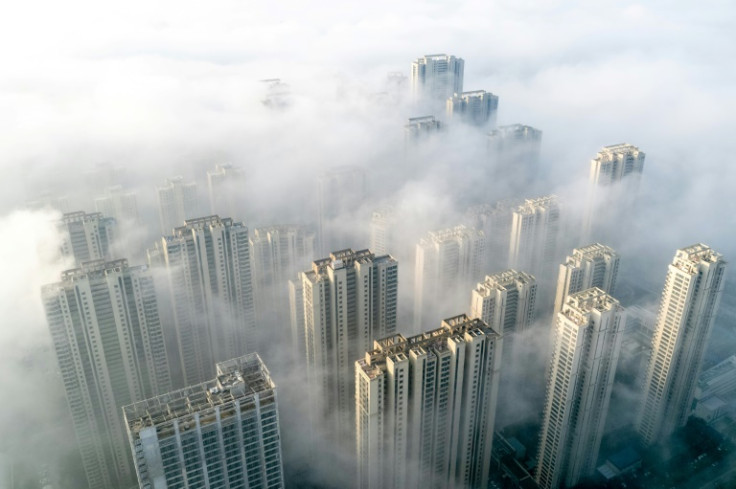China's Property Bubble Bust Is Beginning To Look Like Japan's

China's property bubble bust is beginning to look more and more like Japan's in the early 1990s, which pushed the country into three decades of stagnation, according to Juscelino F. Colares, professor of international business law at Case Western Reserve University.
"Growth-oriented strategies, a bias against domestic consumption, cheap money, and central and provincial government loan guarantees and bailouts created the colossal real estate bubble we see in China today," Colares told International Business Times.
"Some believe that as prices come down—and they have by about 15 percent, with more to come—things will normalize," he said, adding, "But falling birth rates and the slowdown in the decades-old migration from rural to urban centers have made the Chinese real estate bubble look more like Japan's. That nation's bubble-bursting effects linger to this day."
His comments follow an IMF report released last week, which downgraded China's growth prospects for the next four years from the current level of 4.6% to 3.5%.
Professor Colares believes that several factors point to China's sharing a similar fate to that of post-bubble Japan, like slow recovery from COVID and the ongoing decoupling in manufacturing (a result of Western reaction to China's belligerence on Taiwan and in the Indo-Pacific).
"The Japanese response was a large increase in government spending (much of which in infrastructure) and central bank policies designed to signal inflation, to jolt economic actors from a deflationary trap, he told IBT, providing further insight into the policy responses of Beijing to deal with the problem. "But for inflation-signaling, Chinese central and provincial governments have gone the way of infrastructure investment, which some say is already overbuilt," he added. "Thus, further investment might only exacerbate the problem."
Several factors reflect the burst in China's property bubble. First, there was a sharp reversal of residential property prices in the last two years, from a rise of 3.66% in September 2021 to a drop of 3.17% in September 2023. Residential prices in China averaged 3.47% from 2006 until 2023, reaching an all-time high of 10.62% in the second quarter of 2010 and a record low of -5.91 % in the second quarter of 2015.
Second, in the property development sector, with high-profile bankruptcies like the collapse of property giant Evergrande, with more debts of over $300 billion.
Third, in consumer markets, where inflation has turned into deflation. Consumer prices dropped at an annual 0.3% in December 2023, marking the third straight month of decline and the most prominent streak of drop since October 2009.
China's slide into deflation came when Japan was snapping out of it. In the third quarter of 2023, Japan's residential property price index rose at an annual rate of 2.4%, following an even more significant rise in the previous two quarters.
Meanwhile, Japan's deflation has turned into inflation, which averaged close to 3% in 2023.
Aédán Mordecai, lead analyst of Asia Pacific, provided further insight into the "trading places" between the two countries.
"Japan, on the other hand, has experienced uncharacteristically high levels of inflation in the last two years, exceeding the Bank of Japan's (BOJ) 2% target rate. However, the latest inflation data suggests that the rate of price increases may be slowing, driving concerns that the current growth is not driven by domestic demand as hoped but predominately by supply-side factors," he said.
Mordecai thinks recent deflationary pressures have exacerbated China's economic challenges, driven by depressed domestic demand. "Although exports are likely to pick up in 2024, they may not increase as quickly as in previous years and may not make up for the flagging domestic consumption that has failed to bounce back as sharply as Beijing had hoped following the lifting of Covid-19 measures," he added.
He believes Beijing must pursue a more robust fiscal stimulus to drive domestic demand, which it has been somewhat reluctant to do. "Policymakers will be hoping that they can avoid the economic stagnation that plagued Japan in the 90s and beyond, which was characterized by sustained deflation and increasing debt levels," Mordecai explained.
Professor Colares is skeptical about Beijing's efforts to revive the Chinese economy with these conventional policies. "Can the CCP revise its policies and let market forces correct course, or, more likely, will it believe that economic jawboning without a new policy direction—such as an emphasis on domestic consumption, which the CCP has avoided so far—will do the trick?" he asks.
© Copyright IBTimes 2024. All rights reserved.












